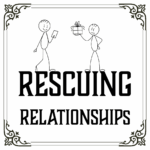Search Result
Relationships
Rescuing relationships
 When a relationship begins to stall or falter, it can feel like everything is slipping through your fingers. But beneath the tension and silence often lies something salvageable. Relationships aren’t puzzles to be solved once and for all. They're living, shifting landscapes. Take it step by step. Offer your best self—and know that, whatever the outcome, doing so is love. Rescuing a relationship isn’t about grand gestures—it’s about small, consistent steps that rebuild trust, restore communication, and rekindle the connection you thought was lost.
When a relationship begins to stall or falter, it can feel like everything is slipping through your fingers. But beneath the tension and silence often lies something salvageable. Relationships aren’t puzzles to be solved once and for all. They're living, shifting landscapes. Take it step by step. Offer your best self—and know that, whatever the outcome, doing so is love. Rescuing a relationship isn’t about grand gestures—it’s about small, consistent steps that rebuild trust, restore communication, and rekindle the connection you thought was lost.
- Start early – don’t let it fester
Deal with difficulties as soon as they arise. The longer you leave them, the more resentment can build, making resolution harder. Silence may feel safer, but it creates distance. - Choose the right setting
Avoid emotionally chaotic environments like airports, pubs, or football matches. Instead, find a quiet, private, neutral place where you both feel safe to talk without distraction. - Keep your energy calm and safe
Stay calm, no matter how heated the topic.
Use non-threatening, open body language.
Sit facing each other without barriers—uncrossed arms, relaxed posture. - Speak honestly, not harshly
Say what you believe the issue is, but don’t be accusatory.
Frame it around behaviours, not identity: “When you did X, I felt Y” rather than “You always…”
Avoid embarrassment or humiliation—your goal is resolution, not revenge. - Listen more than you talk
Listen. Then listen again. And then listen more.
Let him speak without interruption.
Acknowledge his viewpoint, even if you disagree with it. - Reassure, reaffirm, and reflect
Let him know you want the relationship to work.
If you love him, say so.
If you can offer gentle affection—a hand on the arm, a hug—do so, as long as it feels right to both of you. - Be patient with the process
Sometimes solutions don’t come in one conversation.
If things aren't resolved, agree to revisit the topic—set a clear time or date.
Don’t force closure; give space for things to evolve. - Clarify agreements
If you reach an understanding, make sure you both know exactly what that looks like. Misaligned expectations can undo even the best intentions. - Own your share
Be open to the idea that part of the problem may lie with you.
Hear criticism without defensiveness. Growth often starts there. - Common pitfalls to avoid
Jumping to fix things with sex instead of conversation.
Using sarcasm, threats, or withdrawal as tactics.
Expecting immediate forgiveness or transformation.
Talking when one or both of you are exhausted, intoxicated, or emotionally shut down. - Emotional recovery and self-care
These conversations can leave you emotionally and physically depleted.
Take time for yourself afterwards.
If needed, take a day off work. Don’t feel guilty for needing recovery time.
Speak with a friend or therapist to process your feelings.
Write about what was said—sometimes clarity comes in reflection.
Knowing when to let go
Not all relationships can (or should) be saved. Ask yourself:
- Your needs aren’t met reliably: you’ve asked, explained, and compromised—little changes.
- You feel smaller: you censor, shrink or second-guess who you are around them.
- Conflict loops: repetitive arguments or dramatic swings without repair may signal deeper misalignment.
- You’re staying to avoid being alone: that’s understandable, but not sustainable.
- There’s no co-growth: you’re not building or learning together—just maintaining.
- Are you the only one trying?
- Is there respect and safety on both sides?
- Do you feel fundamentally unloved, unseen, or unsafe?
If the answer is yes to these questions—and nothing changes over time—it may be time to step away. Letting go can be the kindest thing you do for yourself and him.
↑ Back to top